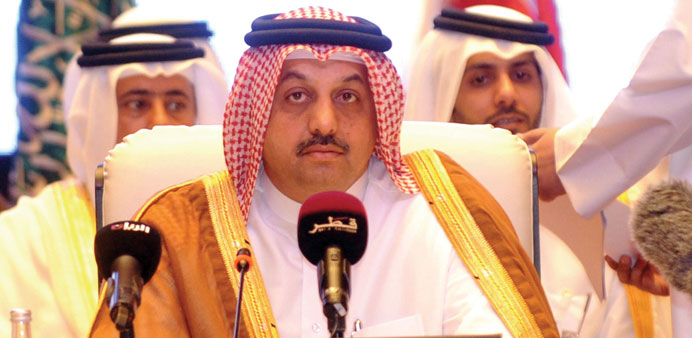QNA/Doha
HE the Foreign Minister Dr Khalid bin Mohamed al-Attiyah has called for more efforts to overcome the challenges that GCC countries and the European Union face, especially the issues that are hindering the final signing of the Free Trade Agreement between the two groups.
Addressing the opening session of the 24th GCC-EU Joint Ministerial meeting in Doha yesterday, Dr al-Attiyah called for rapid growth and development in the pace of GCC-EU relations, especially in the economic and commercial field.
The meeting was held under the chairmanship of Qatar’s Minister of Foreign Affairs.
The meeting tackles the relations between the GCC states and the European Union countries and means of promoting them in all areas, with a focus on issues related to the Free Trade Agreement, and co-operation between the two sides.
Dr al-Attiyah said that the meeting is being held amidst crucial regional and international events, which stress the need to promote relations between the GCC and the EU countries through exploring new horizons of co-operation, expanding the scopes of economic and trade relations and enhancing co-ordination of policies and positions towards international and regional issues.
He pointed out that the European Union is a strategic trade partner of the Gulf Co-operation Council, where two-way trade volume between the two groups rose to more than 148bn Euros in 2014 compared to 100bn Euros in 2010.
At the political level, the Foreign Minister said that the two sides achieved many accomplishments through their unified positions on several regional and international issues, which has played a positive role, particularly in the area of maintaining international peace and security.
HE al-Attiyah underlined the GCC’s keenness and full commitment to preserve Yemen’s unity and territorial integrity, respect its sovereignty and independence and reject any interference in its internal affairs.
He called on the international community to take urgent measures to address the difficult humanitarian situation of the Yemeni people, praising the role of Saudi Arabia in supporting the Yemeni people through the establishment of King Salman Centrefor relief and humanitarian aid.
On the other hand, the Foreign Minister said that the faltering peace process in the Middle East causes a lot of tension within the region and indeed the world.
He called for GCC-EU co-operation with actors in the international community to resume the peace process, lift the siege on Gaza Strip, stop settlement activities and end the Israeli occupation of Arab territories.
The Foreign Minister also discussed the situation in Syria, Libya and Iraq.
On Iran, Dr al-Attiyah underlined that the GCC countries are looking forward to co-operating with Tehran on the basis of principles of good-neighborliness and non-interference in the internal affairs, and solving disputes by peaceful means and end the occupation of the three UAE islands.
The Foreign Minister said that terrorism is the most dangerous challenge facing the international community and poses a real threat to international peace and security, noting the bombing of Qatif mosque in Saudi Arabia last Friday.
He underlined the support for Saudi Arabia in all measures taken to confront acts of violence that aim at destabilising the security and stability and sow sectarian strife.
Meanwhile, The European Union’s (EU) High Representative for Foreign Affairs and Security Policy, the Vice-President of the European Commission Federica Mogherini said that the EU is ready to strengthen trade and economic relations with the GCC countries. The EU is looking forward to more political partnership especially in light of the serious crisis in the region, she added.

HE the Foreign Minister Dr Khalid bin Mohamed al-Attiyah
